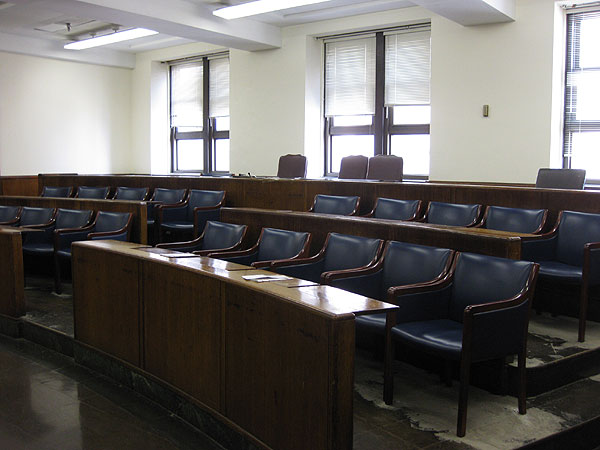 Like millions of other Americans, I’ve spent some time in the last week wondering whether the grand jury proceedings in the shooting death of Michael Brown were a perversion of justice from the get-go. I don’t claim to have had any great societal insights as a result, but I can claim a personal one—the kind of epiphany that sometimes comes from thinking about a universal problem by drawing on your own experience and applying your own area of relative expertise. In my case, I drew on my memories of serving on a grand jury and applied my interpretation of the scientific method.
Like millions of other Americans, I’ve spent some time in the last week wondering whether the grand jury proceedings in the shooting death of Michael Brown were a perversion of justice from the get-go. I don’t claim to have had any great societal insights as a result, but I can claim a personal one—the kind of epiphany that sometimes comes from thinking about a universal problem by drawing on your own experience and applying your own area of relative expertise. In my case, I drew on my memories of serving on a grand jury and applied my interpretation of the scientific method.
In the spring of 1998 I was one of 23 members on a grand jury in Manhattan. We met every weekday morning for a month, deciding a variety of cases, probably several dozen in all. We spent a lot of time waiting. Reading. Chatting. Dozing. Then the door would open, and a prosecutor would walk in. He or she would tell us about the case and what the charge was (or charges were), read aloud the relevant statute(s), and then go about presenting evidence that the defendant was guilty, guilty, guilty: testimony from witnesses, documents, videotapes. Then the prosecutor would leave the room and we would vote whether or not to indict.
For me, the experience was an education. Despite all the evidence of a suspect’s guilt, our job wasn’t remotely to determine guilt or innocence. It was, basically, to give our blessing. We saw no contradicting evidence. We heard no contradicting testimony. We simply had to assess whether prosecutors had enough indications of guilt to go to trial; only then would the contradicting evidence and testimony receive an airing.
Twice that month I voted not to indict. In one case, I noticed a possible discrepancy in the testimony of two police officers as to where they had spotted the gun—on the floor or on the seat—that had given them license to conduct the search of a vehicle that led to the discovery of drugs. I didn’t much care that the jury as a whole voted to indict. There was a lot of other evidence—certainly enough that I could understand why many of my fellow jurors felt a trial was justified.
In the second case, however, the grand jury as a whole voted not to indict. It was a theft case, and the prosecutor screened some security cam footage, but the video was ambiguous at best. We asked a lot of questions, we tried to see the videotape through the prosecutor’s eyes, we asked him to run it again and again, but in the end, once he left our chambers, the discussion prior to our vote basically came down to, “You call that evidence?”
When the prosecutor learned the result of our vote, he stormed back into the room, stood at the front, and raged at us. He wanted us to know—I’m paraphrasing here, but not by much—that we’d just let a previously convicted thief back on the streets.
When he left, we laughed. We were savvy enough by then to know that we hadn’t put a previously convicted shoplifter back on the streets. The prosecutor had—by not presenting evidence adequate enough to satisfy even a grand jury, perhaps the most malleable civic institution in the world. “If the prosecutor wants an indictment and doesn’t get one, something has gone horribly wrong,” FiveThirtyEight recently quoted Andrew D. Leipold, the director of the Program in Criminal Law and Procedure at the University of Illinois College of Law, who has written about the grand jury system. “It just doesn’t happen.”

Now, fifteen years later, in recalling that non-indictment through the prism of the grand jury’s non-indictment in the Michael Brown shooting, I find that the scientific method has become so much a part of my intellectual life that I can’t help applying it.
Scientific investigations generally follow a three-step process. First comes the postulate: an idea that might or might not have a basis in reality. Next comes the hypothesis: a preliminary gathering of evidence to form a narrative of sorts. Once the narrative seems to support the postulate, then comes the theory: the presentation of an argument in support of the narrative, full of both predictions and evidence the validity of which can be falsified.
The judicial system, I’ve come to think, proceeds in much the same way. A prosecutor forms a postulate: The accused is guilty. Then the prosecutor gathers the evidence—say, a video that might or might not show the accused stealing coats—and constructs a narrative to present to a grand jury: This guy stole these luxury items on this date from this Fifth Avenue department store. If the grand jury agrees that this hypothesis has at least a modicum of merit, then comes the argument: not just the narrative and its supporting evidence, but a counter-narrative and its counter-evidence: a trial—not coincidentally, a word that applies to both science and justice.
In the case of the suspect that my grand jury declined to indict, the prosecutor seemed to believe his postulate was worth pursuing, but his belief was actually immaterial. Once he brought the case to a grand jury—once he pursued his postulate—his job was to construct a narrative out of the evidence. Which he did. We just didn’t think the evidence was sufficient to support it.
In the Michael Brown case, the postulate would be: Ferguson police officer Darren Wilson is guilty—an idea that might or might not have a basis in fact. Again, whether St. Louis County Prosecuting Attorney Robert McCulloch believed the postulate is immaterial. Maybe he didn’t. Maybe he brought the case to a grand jury only because to do so was more politically expedient than to not bring the case to a grand jury—but even so, that would be immaterial, too. What mattered was that once he brought the case, his job was to try to construct a hypothesis—to take the evidence and fashion a narrative out of it that supports the postulate.
From all indications, McCulloch didn’t try to form a hypothesis. He gathered evidence, then dumped it at the jurors’ feet, in effect leaving them to find a narrative. Then, having not constructed a hypothesis, he leapfrogged to the trial stage, anticipating any narrative that the jury might construct out of the evidence and challenging it with counter-narratives constructed out of counter-evidence.
So, no, after drawing on my own personal experience as a member of a grand jury and applying my interpretation of the scientific method, I can’t support a postulate that the prosecution of Darren Wilson in the shooting death of Michael Brown was a perversion of justice from the get-go. But after the get-go? My postulate: Robert McCulloch is guilty.
* * *
Thank you for this article; very helpful!
You are absolutely right.